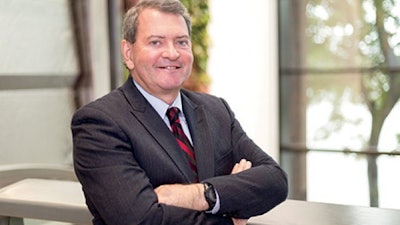With higher education institutions choosing whether to continue online learning for another semester, return to campus for in-person courses or implement a hybrid model amid the COVID-19 pandemic, Roger Williams University (RWU) is allowing students to choose.
Under the “Learn, Work and Serve” (LWS) model, students have the option to take classes remotely or in-person, participate in an internship or research opportunities.
“Instead of focusing on RWU, will we open or not, we began designing our fall semester by asking what students need,” said Dr. Ioannis Miaoulis, president of Bristol, R.I.-based RWU. “Will students want to return to campus? Will they be able to? How do our students learn best? Those questions drove us to not just think about being in person or online in a binary way.”
 Dr. Ioannis Miaoulis
Dr. Ioannis MiaoulisTo accommodate various students’ learning styles, there will be a mix of in-person, remote and hybrid courses available for students to choose from. RWU offers more than 1,100 courses a semester.
“Our course delivery is going to be nimble for reaching students wherever they are,” said Dr. Brian G. Williams, interim chief of staff and vice president for enrollment management and marketing at RWU. “And if they prefer that certain learning style, there’s enough courses.”
Students will individually meet with the school’s admissions office to plan their semester by expressing their preferences for learning and goals for their coursework.
“We’ll then work with our staff and faculty across campus to look at our existing opportunities or see if it’s possible to create new ones to meet the student’s learning goals,” said Miaoulis.
Students have the ability to mix and match their options for the semester. For example, they may choose to work a part-time job alongside online classes or take courses in-person and participate in community-engagement work.
According to Williams, over 95% of RWU’s students who were enrolled in the spring are intending to return in the fall.
However, due to the need to take health and safety precautions given the ongoing COVID-19 pandemic, the campus will look different. In classrooms, there will be fewer seats. For some courses, there will be an alternate system where students switch off between in-person and virtual attendance.
“We’ve put a lot of great work into our reopening Roger plan for how dining services will be delivered, how student clubs and organizations will still meet,” said Williams. “So there’ll be restrictions that you see in the guidelines that you see for any restaurant, any business reopening that we’re adhering to as a community. But we’ll go through those steps together as a community and it’ll be great to be together.”
In terms of residential areas, there has not been state guidance for RWU to implement single rooms. Students will still have roommates and housing will be almost at normal capacity. However, there will not be any built-in triple rooms.
 Dr. Brian G. Williams
Dr. Brian G. WilliamsOne difference will be a limit on restroom and shower facility use. Students will be required to be in specific places to avoid intersection with others in the residence halls.
“We’re looking at all of our procedures right now in terms of guest policies and visitors and such as well,” said Williams. “So those … things might be a little different.” However, those changes are for the sake of keeping someone’s residence hall “sort of a sacred space for them for safety and health,” Williams added.
For social gatherings on campus, RWU will follow state restrictions on capacity limits.
“There are a lot of traditional events on a college campus and things that happen every semester,” said Williams. “So, we’ll look for ways to deliver those really creatively instead of canceling things. But the delivery is going to look a little different, perhaps, but not something that is restrictive or limit the campus experience.”
Under its reopening model, RWU is challenging students to “take a moment and make a difference,” according to Williams.
“The world needs students right now,” he added. “We’re going to lean in and make a difference and be engaged. And we do hope they take this opportunity to think, ‘What is my degree for and who is it for?’”
Developing the reopening plan has been a collaborative effort with students, faculty, staff, the State Department of Health and other institutions around the state.
“I don’t think any of the planning we’ve been doing is going to be surprising for anyone in the community,” said Williams.
As a small campus, Williams said there is the benefit of “caring and really knowing one another,” adding that666 RWU is a “personalized campus” and its leadership “can make decisions at a scale that really works for the university of our size.”
Sarah Wood can be reached at [email protected].


















